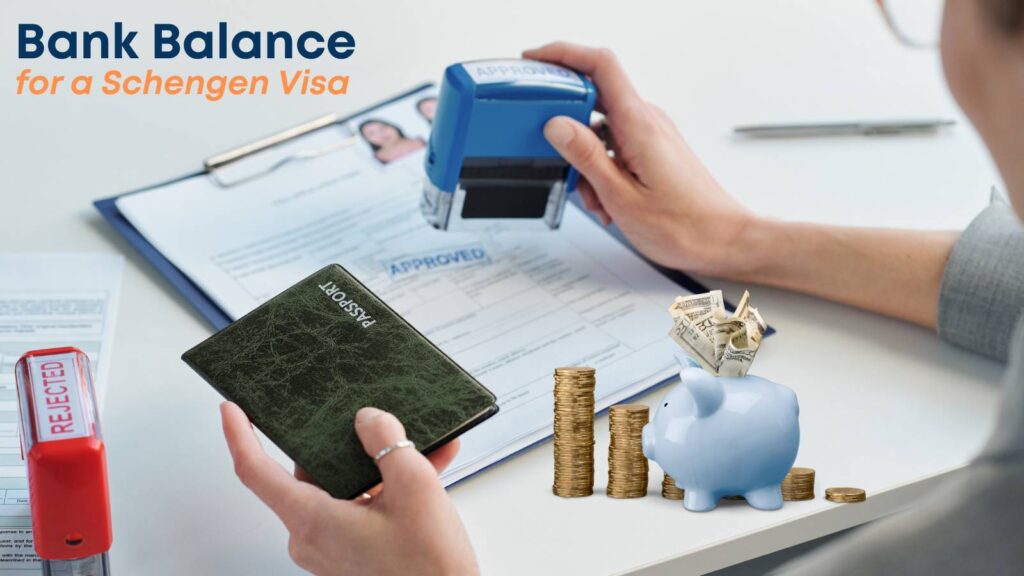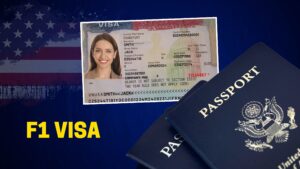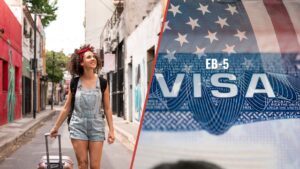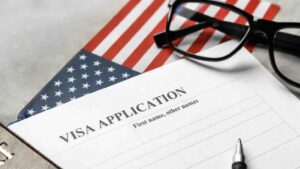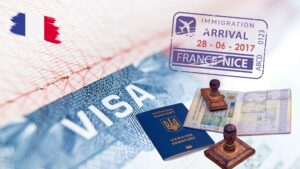Applying for a Schengen visa involves fulfilling several requirements, and one of the most important among them is demonstrating financial capability. Travelers must prove that they can cover their expenses during their stay without depending on unauthorized employment or public assistance. This requirement is known as the Minimum Bank Balance for a Schengen Visa, and it is one of the leading factors that determine whether an application is approved or rejected.
This guide provides detailed information on why the minimum balance is necessary, how much is required for different countries, how it is calculated, what documents are accepted, and the common mistakes that applicants should avoid.
Why Does Bank Balance Matter for a Schengen Visa?
The requirement to show adequate financial means is not optional but a mandatory part of the Schengen visa process. Authorities within the Schengen zone need assurance that visitors have sufficient resources to support themselves throughout the trip. This requirement exists for several reasons:
- Prevention of Overstaying: When travelers have strong financial proof, it reduces the risk of them overstaying or seeking illegal employment.
- Ensuring Self-Sufficiency: Authorities want to confirm that travelers will not depend on state support such as housing, food, or healthcare.
- Coverage of Travel Costs: Proof of funds demonstrates that applicants can afford accommodation, meals, transport, and daily expenses during their visit.
- Emergency Preparedness: Adequate balance ensures that travelers can manage unexpected situations such as medical emergencies or urgent travel changes.
In summary, the Minimum Bank Balance for a Schengen Visa is a safeguard for both the applicant and the host country. It provides consular officers with evidence that the applicant’s trip is financially secure and realistic.
Minimum Bank Balance for a Schengen Visa in 2025
The amount of money required is not uniform across the Schengen area. Each country sets its own daily minimum amount that visitors must prove. On average, the requirement ranges between €50 and €120 per day of stay. This is meant to cover lodging, meals, local transportation, and personal expenses.
For short visits, such as tourism or business trips, the requirement can add up to a significant amount. For example, a traveler planning a 15-day visit to Spain, with a daily requirement of €113, would need to demonstrate a balance of at least €1,695. Similarly, for a 30-day visit to Germany with a €45 daily requirement, the balance should be no less than €1,350.
It is also important to note that visa officers evaluate the overall financial picture, not just the final balance. A stable account history, with consistent income and reasonable withdrawals, strengthens the case. A sudden large deposit shortly before applying often raises concerns about the authenticity of the funds.
Country-Wise Minimum Bank Balance Requirements
While the Schengen visa rules are coordinated, the financial requirements differ across member states. Below are some examples of the amounts set by popular Schengen destinations:
- France: Travelers must demonstrate €65 per day if they are staying in hotels or similar accommodation. For those staying with a host who provides proof of accommodation, the requirement is reduced to €32.25 per day. If the applicant does not provide proof of prepaid lodging, the requirement can go as high as €120 per day.
- Germany: A minimum of €45 per day is required. Students applying for long-term stays are often required to open a “blocked account” with a fixed annual sum of approximately €11,208, which covers basic living expenses during their stay.
- Italy: Italy calculates requirements based on both the duration of stay and the number of travelers. For stays up to five days, a single traveler must show €269.60. For longer stays, the requirement increases according to official scales published by Italian authorities.
- Spain: Spain enforces one of the strictest requirements. As of 2025, travelers must show at least €113 per day, with a minimum total of €1,008 regardless of the length of stay.
- Netherlands: The requirement is approximately €55 per day per traveler, which is moderate compared to Spain and France.
- Belgium: Travelers must show €95 per day if they are staying in hotels. If they are accommodated in cheaper facilities or hosted by family, the amount reduces to €45 per day.
These variations demonstrate why it is essential to check the official consulate guidelines of the destination country before applying. Assuming a standard figure across all Schengen states can lead to under-prepared applications and possible rejection.
How to Calculate the Required Bank Balance
The calculation is generally based on the daily requirement multiplied by the total number of travel days. For example:
- Tourist visiting France for 10 days: €65 × 10 = €650 minimum balance required.
- Traveler visiting Spain for 30 days: €100 × 30 = €3,000 minimum balance required.
Applicants should always maintain a slightly higher balance than the minimum requirement. This buffer demonstrates financial safety and reduces the risk of rejection. For example, if the required balance is €650, maintaining €1,000 offers stronger proof of financial readiness.
Accepted Proof of Financial Means for Schengen Visa
Financial stability is assessed through multiple types of documents. Commonly accepted proofs include:
- Recent Bank Statements: Usually covering the last three to six months, showing both balances and transaction history. These should be officially stamped and signed by the bank.
- Fixed Deposits or Savings Certificates: Long-term funds that can be accessed if needed. These show financial reliability.
- Sponsorship Letters: When a family member or host provides financial support, a formal affidavit of support must be submitted along with their financial records.
- Traveler’s Cheques or Prepaid Travel Cards: Though less common today, these are still accepted as supplementary evidence of funds.
- Payslips and Employment Contracts: Evidence of regular income that proves financial stability beyond savings alone.
Combining different types of documents provides stronger assurance of financial readiness.
Common Myths About Schengen Visa Bank Balance
Several misconceptions exist among applicants regarding the financial requirements:
- A one-time large deposit is sufficient: In reality, visa officers analyze account history and financial behavior. Consistency is more valuable than sudden wealth.
- Only the applicant’s funds matter: Sponsors, family members, and joint accounts can be used if supported by proper documentation.
- Credit cards replace savings: While useful as additional proof, credit cards cannot substitute for liquid savings or deposits.
- Meeting the minimum balance guarantees approval: The balance is only one factor. Authorities also examine purpose of visit, travel history, and ties to the home country.
Understanding these myths helps applicants prepare documents realistically and avoid preventable rejections.
Mistakes That Lead to Visa Rejection
Financial issues are one of the most common causes of Schengen visa denials. Common mistakes include:
- Irregular Bank History: Sudden deposits, inconsistent income, or unexplained withdrawals can appear suspicious.
- Providing Bare Minimum Funds: Submitting just enough to meet requirements may create doubts about financial stability.
- Incomplete Documentation: Missing bank seals, unsigned statements, or documents in the wrong format are common reasons for rejection.
- Ignoring Country-Specific Rules: Applicants often fail to research the exact requirements for their destination, leading to insufficient proof.
Avoiding these mistakes by preparing finances well in advance greatly increases the likelihood of approval.
Tips to Increase the Chances of Approval
Applicants can strengthen their applications with the following practices:
- Maintain a Stable Balance: Keep adequate funds in accounts consistently for at least three to six months before applying.
- Show More Than the Minimum: Providing higher balances than required reassures authorities of financial security.
- Demonstrate Strong Ties to Home Country: Property ownership, family commitments, and employment contracts reduce perceived risks of overstaying.
- Use Multiple Sources of Proof: Supplement bank statements with savings, sponsorship letters, or income documents.
- Provide Prepaid Bookings: Hotel and flight reservations reduce financial burden, but supporting balance is still necessary.
These steps show preparation and reliability, key qualities visa officers look for in successful applications.
FAQs
Q1. What if I don’t meet the minimum bank balance requirement?
You may use a sponsor, show joint accounts, or provide additional assets as financial support.
Q2. Do students have different requirements?
Yes, students often use blocked accounts, scholarships, or sponsorships as financial proof.
Q3. Can family members show their account balance for me?
Yes, provided a sponsorship affidavit and supporting documents are submitted.
Q4. Is cash at home acceptable proof?
No, only official, verifiable documents such as bank statements and deposits are accepted.
Q5. What is the minimum bank balance for a Schengen visa?
Usually €40–€120 per day, depending on the country and trip length.
Q6. Do all Schengen countries have the same requirement?
No. Each country sets its own daily amount (e.g., Spain €100/day, Germany €45/day).
Q7. How do I calculate the required balance?
Multiply the country’s daily requirement by your number of days, then keep extra for safety.
Q8. Do I need to maintain the balance for months?
Yes, most embassies check 3–6 months of bank statements.
Q9. Can I use a sponsor’s bank account?
Yes, with a sponsorship affidavit and financial proof from your sponsor.
Q10. Is a blocked account required for tourists?
No. It’s only mandatory for students in some countries (like Germany).
Q11. Are credit card statements enough?
No, they can support but not replace bank balance proof.
